A Greener Weed: Certified Pesticide-Free Cannabis Comes to Colorado
The brand-new certification gives options to consumers looking for cleaner cannabis.
A Greener Weed: Certified Pesticide-Free Cannabis Comes to Colorado
The brand-new certification gives options to consumers looking for cleaner cannabis.
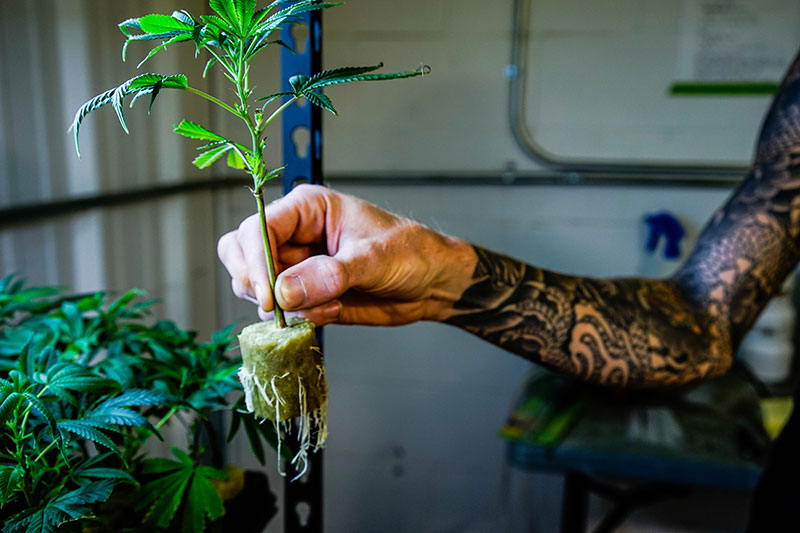
Steinkraus spends the next several hours explaining to inspector Jen Silverman how he grows his plants – with love and painstaking care, but without pesticides. That’s because this hot August day is the first-ever inspection for Colorado’s new pesticide-free cannabis certification, administered by the Organic Cannabis Association (OCA). Denver Bud Company is the first grower to ever pursue it.
“You guys are the pioneers,” Silverman says to Steinkraus. “I’m just the link between producer and certifier. I’m here to make sure the liability is shared, and very transparent.”
Silverman, notebook in hand, listens intently as Steinkraus describes his pest care regimen for the mother plants. To control pests, he says, he mixes reverse osmosis water with rosemary oil and eucalyptus oil. “Every four, five days, I’ll give the plants that nice organic spray of essential oils,” he says.
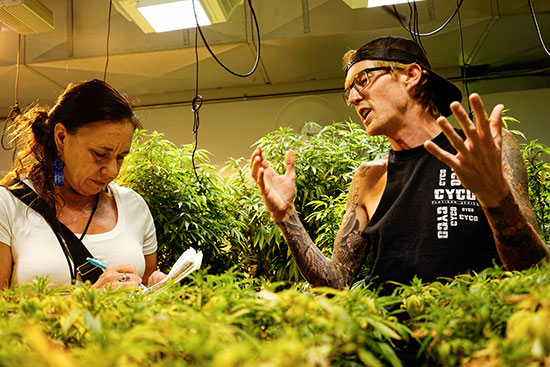
Silverman counsels Steinkraus to add the rosemary-eucalyptus spray to the pest plan he’ll submit as part of certification. They discuss his other pest prevention measures: an organic soil mixture, proper airflow and ventilation in the room, a neem-oil based miticide used on occasion.
Everything Steinkraus uses is “OMRI Listed” – certified by the Organic Materials Review Institute, the organization that actually decides whether a product is organic under the USDA National Organic Program. Silverman, who’s been doing USDA organic certification on farms of all sorts for more than 12 years, shares best practices with Steinkraus as they walk the floor. To be clear, this is not an organic inspection. Cannabis is still a federally illegal substance and thus can’t be called “organic,” nor can it be certified organic by the USDA or otherwise – but everyone in the room believes it’s only a matter of time before that changes. Pesticide-free, in a sense, is the launch pad.
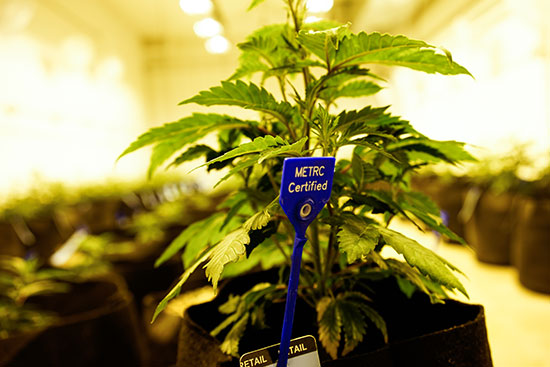
In the vegetative room – or “veg” room, where baby clones become teen plants – they begin sampling. Steinkraus dons sterile gloves, dips his clippers in alcohol, clips a few leaves from a plant toward the front of the room. He slips the leaves into a sample baggie, which Silverman labels with the room number and plant number – the same number assigned by Marijuana Enforcement Tracking Reporting Compliance, or METRC, to trace every cannabis plant on the Colorado market from seed to shelf. Steinkraus and OCA cofounder Ben Gelt look on as Silverman weighs the baggie.
“Two grams,” Silverman says. “This is sample number one.”
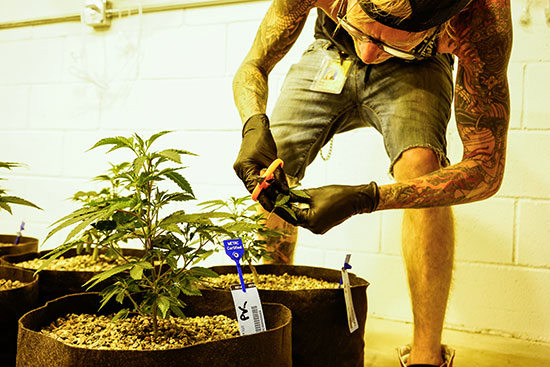
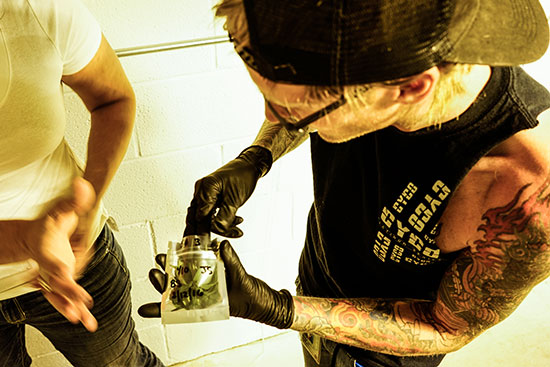
They repeat the process, clipping samples from plants at the middle and back of the room. Silverman seals the baggies inside a larger bag labeled with the room number. They follow the same procedure for both veg rooms. Later, they heat seal the larger bags to prevent tampering. It’s up to Denver Bud Company to safely store these samples and transport them to the lab to be tested for pesticide residues. In a few days, Denver Bud Company will receive an OCA inspection report.
“Based on what we heard today, it sounds like there may be some small adjustments Jen will recommend,” Gelt says. A second site inspection will follow, and Silverman will sample from the flowering room. Down the road, she’ll pay a surprise visit, too. If all goes well, Denver Bud Company will have pesticide-free certification within a few months.
This process is designed to be even more rigorous than USDA organic certification, Gelt says, requiring up to four inspections and as many rounds of samples. The price tag starts at $5,000, and certification and the distinctive pesticide-free label both last one year. Hundreds of growers have inquired about the process, and more than a dozen are already in line for their first inspection. OCA hopes to complete at least five certifications in Colorado by year’s end, and enter other states where recreational cannabis is legal by early 2017. With the ability to charge a premium for their certified product – it’s unclear exactly how much more, but organic foods sell for an average of 47 percent more than conventional food, according to a recent study – growers like Josh Egle, founder of Denver Bud Company, say the process will pay for itself.
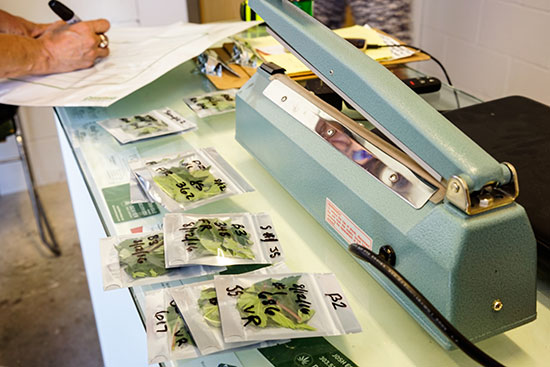
And Egle welcomes the rigor. He’s been committed to growing marijuana without pesticides for years; even before he entered the industry, he grew organic weed for his mother to treat her multiple sclerosis – and OCA is finally providing a way to legitimize his approach and provide consumers with a genuine pesticide-free option. “We got into this business to be the good guys,” Egle says. “It’s important to me that the product we put out is helping people instead of hurting people.”
For OCA founder John-Paul Maxfield, who also owns Waste Farmers and Maxfield’s, an organic soil company, creating a pesticide-free certification is all part of the pursuit to make the world a more sustainable place through better agricultural practices. Pesticide-free certification is crucial in helping the cannabis industry catch up with food, he says, and allows consumers to choose their cannabis with the same values they apply to food.
“The goal is to incentivize safe growing practices through market mechanisms,” Maxfield says. “Encouraging clean, sustainable and ultimately organic methods through certification will help create differentiation in the marketplace.”
“Nobody likes fucking chemicals. Nobody likes shitty practices that destroy the planet,” he adds. “The issue is, they don’t know about it.”
Follow us
This work is licensed under a Creative Commons Attribution-NoDerivatives 4.0 International License.
Want to republish a Modern Farmer story?
We are happy for Modern Farmer stories to be shared, and encourage you to republish our articles for your audience. When doing so, we ask that you follow these guidelines:
Please credit us and our writers
For the author byline, please use “Author Name, Modern Farmer.” At the top of our stories, if on the web, please include this text and link: “This story was originally published by Modern Farmer.”
Please make sure to include a link back to either our home page or the article URL.
At the bottom of the story, please include the following text:
“Modern Farmer is a nonprofit initiative dedicated to raising awareness and catalyzing action at the intersection of food, agriculture, and society. Read more at <link>Modern Farmer</link>.”
Use our widget
We’d like to be able to track our stories, so we ask that if you republish our content, you do so using our widget (located on the left hand side of the article). The HTML code has a built-in tracker that tells us the data and domain where the story was published, as well as view counts.
Check the image requirements
It’s your responsibility to confirm you're licensed to republish images in our articles. Some images, such as those from commercial providers, don't allow their images to be republished without permission or payment. Copyright terms are generally listed in the image caption and attribution. You are welcome to omit our images or substitute with your own. Charts and interactive graphics follow the same rules.
Don’t change too much. Or, ask us first.
Articles must be republished in their entirety. It’s okay to change references to time (“today” to “yesterday”) or location (“Iowa City, IA” to “here”). But please keep everything else the same.
If you feel strongly that a more material edit needs to be made, get in touch with us at [email protected]. We’re happy to discuss it with the original author, but we must have prior approval for changes before publication.
Special cases
Extracts. You may run the first few lines or paragraphs of the article and then say: “Read the full article at Modern Farmer” with a link back to the original article.
Quotes. You may quote authors provided you include a link back to the article URL.
Translations. These require writer approval. To inquire about translation of a Modern Farmer article, contact us at [email protected]
Signed consent / copyright release forms. These are not required, provided you are following these guidelines.
Print. Articles can be republished in print under these same rules, with the exception that you do not need to include the links.
Tag us
When sharing the story on social media, please tag us using the following: - Twitter (@ModFarm) - Facebook (@ModernFarmerMedia) - Instagram (@modfarm)
Use our content respectfully
Modern Farmer is a nonprofit and as such we share our content for free and in good faith in order to reach new audiences. Respectfully,
No selling ads against our stories. It’s okay to put our stories on pages with ads.
Don’t republish our material wholesale, or automatically; you need to select stories to be republished individually.
You have no rights to sell, license, syndicate, or otherwise represent yourself as the authorized owner of our material to any third parties. This means that you cannot actively publish or submit our work for syndication to third party platforms or apps like Apple News or Google News. We understand that publishers cannot fully control when certain third parties automatically summarize or crawl content from publishers’ own sites.
Keep in touch
We want to hear from you if you love Modern Farmer content, have a collaboration idea, or anything else to share. As a nonprofit outlet, we work in service of our community and are always open to comments, feedback, and ideas. Contact us at [email protected].by Christi Turner, Modern Farmer
August 24, 2016
Modern Farmer Weekly
Solutions Hub
Innovations, ideas and inspiration. Actionable solutions for a resilient food system.
ExploreExplore other topics
Share With Us
We want to hear from Modern Farmer readers who have thoughtful commentary, actionable solutions, or helpful ideas to share.
SubmitNecessary cookies are absolutely essential for the website to function properly. This category only includes cookies that ensures basic functionalities and security features of the website. These cookies do not store any personal information.
Any cookies that may not be particularly necessary for the website to function and are used specifically to collect user personal data via analytics, ads, other embedded contents are termed as non-necessary cookies.